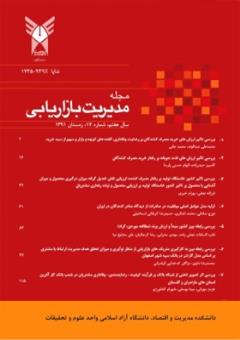نقش فشار مدیرعامل در تصمیم گیریهای مديريت سود با تأکید بر ویژگیهای شخصیتی مدیران مالی
محورهای موضوعی : مدیریت بازاریابی
علی رمزی مژدهه
1
,
محمدرضا وطن پرست
2
*
,
مهدی مشکی
3
![]()
1 - دانشجوی دکتری تخصصی،گروه حسابداری، واحد رشت، دانشگاه آزاد اسلامی، رشت ، ایران
2 - استادیارگروه حسابداری، واحد رشت، دانشگاه آزاد اسلامی، رشت، ایران
3 - دانشیار مالی ، گروه حسابداری و مالی، دانشگاه پیام نور، تهران، ایران
کلید واژه: ويژگیهای شخصیتی, فشار مدیر عامل, هوش هیجانی, خودشیفتگی, عدم پایبندی به اخلاق, مديريت سود.,
چکیده مقاله :
در اين مقاله نقش فشار مدیرعامل در تصمیم گیریهای مديريت سود با تأکید بر ویژگیهای شخصیتی با سه رويکرد رفتاری در نمونه آماری به تعداد 65 نفر از مدیران مالی شرکتهای بورسی مورد بررسی قرار گرفته است. فشار مدیرعامل به عنوان متغیر مستقل و تصمیم گیریهای مدیریت سود به عنوان متغیر وابسته و ویژگیهای شخصیتی بعنوان متغیر تعدیل گر و دموگرافی افراد بعنوان متغیر کنترلی مدیران مالی در نظر گرفته شد. همچنین پژوهش حاضر از لحاظ روش گردآوری دادهها یک پژوهش پیمایشی و توصیفی و کمی و از نوع همبستگی و پس رویدادی است. جامعه آماری این تحقیق کلیه شرکتهای فعال در بورس اوراق بهادار تهران که در 2 سال اخیر، از سال 1398 و 1399 صورتهای مالی آنها حسابرسی شده باشد، انتخاب شده است. با توجه به اینکه جامعه تحقیق محدود و شامل تمامی مدیران مالی شرکتهای بورسی است، بهترین روش نمونه گیری، روش نمونهگیری هدفمند از نمونههای در دسترس خواهد بود. همچنین قلمرو زمانی این تحقیق برای جامعه مورد مطالعه شامل مدیران مالی شرکتهای پذیرفته شده در سال 1399 میباشد. برای تعیین پایایی پرسشنامه، ابتدا از طریق پیش آزمون، تعدادی پرسشنامه بین یک نمونه تصادفی توزیع شد و سپس با استفاده از نرم افزار SPSS ضریب آلفای کرونباخ محاسبه گردید و برای آزمون فرضیهها از رگرسیون حداقل مربعات در نرم افزار ایویوز استفاده شد. نتايج اين پژوهش نشان میدهد رابطه مثبت و معناداری بین فشار مدیرعامل بر تصمیمات مدیریت سود وجود دارد. اما رابطه معناداری بین فشار مدیرعامل بر تصمیمات مدیریت سود با دو رویکرد رعایت و عدم رعایت استانداردهای حسابداری وجود ندارد. همچنین عوامل تعدیل گر ویژگیهای شخصیتی بغیر از هوش هیجانی، تأثیر معناداری در تصمیمات مدیریت سود نداشته است. بنابراين به نظر میرسد در ایران چون مديران مالی توسط مدیران عامل شرکتها انتخاب میشوند، مدیران جهت تأمین اهداف خود آنها را زیر سلطه میگیرند. مدیران مالی در چنین شرایطی جهت حفظ منافع و موقعیت شغلی و ارتقاء جایگاه سازمانی خود در تصمیم گیریهای مدیریت سود، ويژگیهای شخصیتی و استانداردهای حسابداری را مد نظر قرار نمی دهند.
In this article, the role of CEO pressure in profit management decisions has been investigated with an emphasis on personality traits with three behavioral approaches in a statistical sample of 65 financial managers of listed companies. CEO pressure was considered as an independent variable, profit management decisions as a dependent variable, personality characteristics as a moderating variable, and people's demographics as a control variable of financial managers. Also, in terms of the data collection method, the current research is a survey, descriptive and quantitative research, of correlational and post-event type. The statistical population of this research has been selected from all companies active in the Tehran Stock Exchange whose financial statements have been audited in the last 2 years, from 2018 and 2019. Considering that the research community is limited and includes all financial managers of listed companies, the best sampling method will be the targeted sampling method from the available samples. Also, the time domain of this research for the studied community includes financial managers of accepted companies in 2019. To determine the reliability of the questionnaire, first through a pre-test, a number of questionnaires were distributed among a random sample, and then Cronbach's alpha coefficient was calculated using SPSS software, and Least Squares regression was used to test the hypotheses. The results of this research show that there is a positive and significant relationship between CEO pressure on profit management decisions. However, there is no significant relationship between the CEO's pressure on profit management decisions with the two approaches of compliance and non-compliance with accounting standards. Also, the modulating factors of personality characteristics, except for emotional intelligence, did not have a significant effect on profit management decisions. Therefore, it seems that in Iran, since the financial managers are chosen by the CEOs of the companies, the managers dominate them in order to achieve their goals. In such circumstances, financial managers do not consider personality traits and accounting standards in order to maintain their interests and job position and improve their organizational status in profit management decisions.

